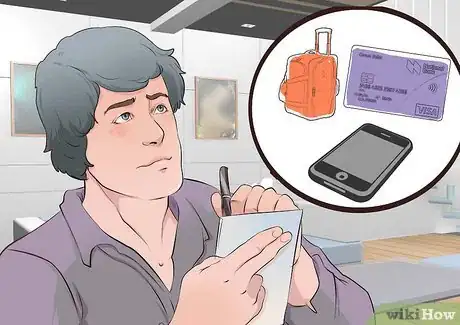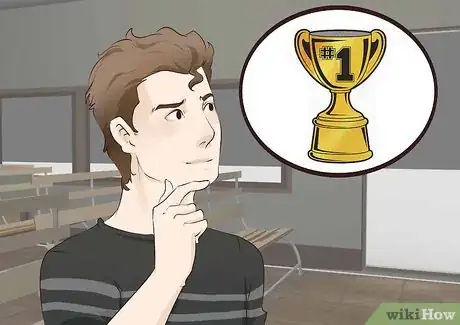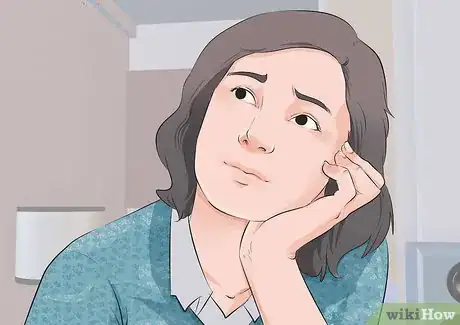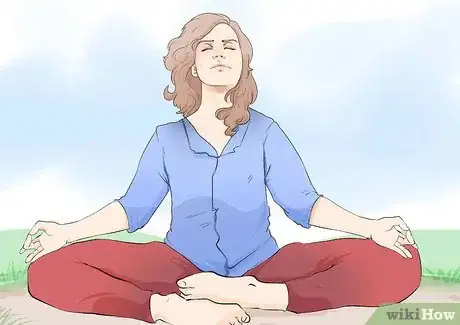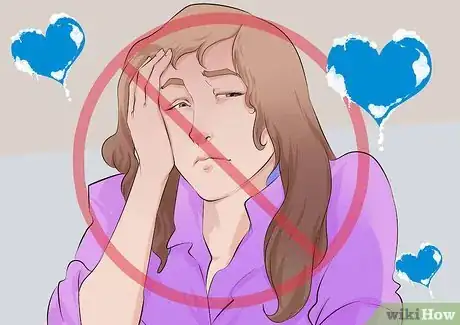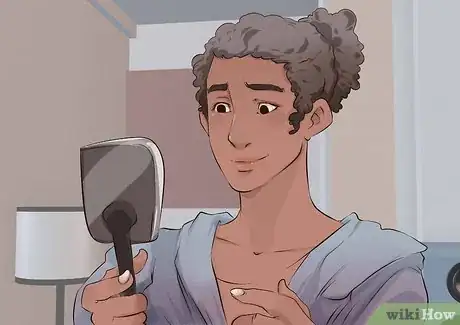This article was co-authored by Allison Broennimann, PhD. Dr. Allison Broennimann is a licensed Clinical Psychologist with a private practice based in the San Francisco Bay Area providing psychotherapy and neuropsychology services. With over a decade of experience, Dr. Broennimann specializes in in-depth psychotherapy to provide solution-focused treatments for anxiety, depression, relationship problems, grief, adjustment problems, traumatic stress, and phase-of-life transitions. And as part of her neuropsychology practice, she integrates depth psychotherapy and cognitive rehabilitation for those recovering after traumatic brain injury. Dr. Broennimann holds a BA in Psychology from the University of California, Santa Cruz, and an MS and Ph.D. in Clinical Psychology from Palo Alto University. She is licensed by the California Board of Psychology and is a member of the American Psychological Association.
wikiHow marks an article as reader-approved once it receives enough positive feedback. In this case, 100% of readers who voted found the article helpful, earning it our reader-approved status.
This article has been viewed 382,168 times.
Romantic relationships are not at all necessary to lead a happy life. While some people may find them fulfilling, others are much happier living on their own. Whether you never plan on pursuing a romantic relationship or you're open to it in the future, it's important to focus on living a fulfilling life that makes you happy. Happiness is different for everyone, so take a good look at yourself and decide what it is that fulfills you.
Steps
Enjoying Your Free Time
-
1Focus on experiences. New and unique experiences enrich people's lives and help them feel happier overall. Whenever possible, spend your free time trying new things, going new places, and experiencing life.
- If you have a little money set aside to treat yourself, consider investing in an experience, like a vacation, instead of an object. The experience will leave you with great memories that you can look back on for the rest of your life, which will increase your happiness.
- Don't feel like you always need to have someone with you to enjoy these experiences. As a single person, you can choose to have adventures with friends and family or alone.
-
2Try volunteering. Volunteering for a worthy cause greatly increases people's sense of self-worth and fulfillment. Look for an organization in your area that has a mission you believe in and find out how you can help. As a bonus, you may also meet new friends who also care about the cause.[1]
- If you don't have the time to commit to ongoing volunteer work, there are plenty of short-term volunteer opportunities out there. Even a few hours of volunteering is meaningful.
Advertisement -
3Enjoy physical activity. Many people find that exercise increases their happiness and makes them feel better about themselves. Try finding a type of exercise that you enjoy, whether it's playing a team sport or going for walks.[2]
-
4Spend alone time constructively. It's fine to spend time at home alone, as long as you don't become bored and isolated. To avoid this, use your alone time to cultivate your creative interests or learn new things.[3]
- Try taking an online class or developing a new hobby, like painting or sewing.
- Avoid watching too much television, as this can become a stand-in for social relationships.
Pursuing Your Dreams
-
1Visualize your future and set goals. If you want to achieve something, it's important to make the goals concrete. Take some time to reflect on what exactly you want to accomplish in your life and what steps you need to take to get there.[4]
- Make sure your goals are things that you can accomplish on your own. Do not, for example, focus your goals around getting married.
- As you are setting goals for yourself, be sure they are things that you believe will genuinely help you feel fulfilled, not things that you feel are expected of you.
- Don't be afraid to change your plan along the way, as long as you're not giving up on something you still want. Aspirations change over time and that's perfectly fine.
- Remind yourself of your goals when times get tough. Focusing on your end-goal can help you persevere.
-
2Constantly challenge yourself. People often get stuck in life because they get too comfortable. If you want to keep reaching for your dreams, you have to find new challenges for yourself to overcome. This will not only help you achieve more, but it will also keep you more mentally stimulated and fulfilled.[5]
- This may sometimes require making a difficult or "less safe" choice, but remind yourself that you need to step outside of your comfort zone at times in order to achieve your goals.
-
3Celebrate your victories. It's important to be your own cheerleader and to never stop being proud of yourself for everything you accomplish. Rewarding yourself will help you feel satisfied about what you have already done and stay motivated to do even more.[6]
- Try setting small, very attainable goals for yourself and celebrating each time you meet one. Your reward can be anything you enjoy, from a day at the beach to a party with friends.
- When you achieve a larger goal, give yourself a bigger reward, like a great vacation.
-
4Don't forget to live in the moment. Focusing too much on goals can cause people to lose sight of life's little pleasures. While it's great to be have dreams, it's also important to slow down and enjoy what is happening in your life at the moment.
- If you find that you are so wrapped up in work that you are not enjoying life, you need to take a step back and reevaluate your priorities. Working to achieve your goals should increase your happiness, not decrease it.
- Take this time to really dig deep into what makes you feel joy. Being your own best friend will only increase your potential for love.[7]
Making Connections With Others
-
1Be social. People are hard-wired to have relationships with other human beings, so even if you don't have a romantic relationship, it's important to maintain social ones. Keep in contact with friends and family, and try to spend time with other people as much as you can.[8]
- You don't have to be the most extroverted person to enjoy social relationships. Some people enjoy attending frequent parties with lots of people, while others prefer the company of a few close friends. Both are perfectly fine!
-
2Meet new people who share your interests. While it's very important to maintain your existing relationships, it's also helpful to get out there and meet new people. Try joining clubs or groups that are centered around activities you enjoy. This will help you make new friends who share your passions.[9]
- New friends can expand your horizons, which is always a good thing! Don't be afraid to talk to people who are different than you and try new things.
-
3Get a pet. Pets are wonderful companions. They can help keep you active and prevent you from feeling lonely, which is especially important if you live alone. If you don't already have one, consider adopting a cat, a dog, or another pet.[10]
- Pets make people feel needed because they rely on their owners for basic care. Dogs in particular can add a lot of structure to a person's life because they require regular walking.
- If you're not willing to commit to owning a pet, offer to walk your neighbor's dog or volunteer at a local animal shelter.
Developing Your Self Esteem
-
1Take care of yourself. In order to truly be happy, you need to take care of your body and your mind. It's easy to to neglect yourself because of work, family, and other responsibilities, but try to take at least some time every day to nurture yourself and remind yourself how important you are.[11]
- Try doing something relaxing, like meditating or getting a massage. This is a great way to unwind and show yourself some love.
- If you have physical or mental health problems, be sure to get the treatment you need. Ignoring your symptoms will only cause the problem to become worse, and may inhibit you from leading the happy life you deserve.
-
2Don't compare yourself to others. It's tempting to look at other people's lives and imagine that they are much better than your own, but it's important to keep things in perspective. The truth is that you can only see another individual's life from the outside, so it's not really possible to compare your life to theirs. Instead of even trying, focus on all of the positive things in your own life.
- Social media makes it even easier to compare yourself to others. If you feel depressed after looking at your friends' profiles, remind yourself that the pictures they post are just the image they want everyone else to see, and not necessarily what their lives are really like.
-
3Stop beating yourself up. Life doesn't always go as planned, and it's important to learn to accept that. Instead of thinking of yourself as a failure when you don't achieve a goal, use the situation as a learning experience and set a new goal for yourself.[12]
- If you're beating yourself up about your lack of a romantic relationship, remind yourself that there are many other things in your life that make you happy. Let yourself be open to the possibility of having a romantic relationship, but don't stop focusing on your other pursuits.
- It's okay if deep down, you really want to find love. Embrace that feeling—it will eventually help you find a healthier relationship.[13]
-
4Stay true to yourself. No matter what happens in life, you must always remember who you are and what you believe in. Think about the values that matter most to you, and make sure that you uphold those values in everything you do.[14]
- If friends try to lead you down a path that does not match your values, find new friends who share your beliefs and accept you for who you are.
- Your career should not force you to abandon your values either. You may be faced with situations that challenge your moral compass, and these are the times to reassert who you are and what you believe in.
Expert Q&A
Did you know you can get expert answers for this article?
Unlock expert answers by supporting wikiHow
-
QuestionIs it possible to be happy without a partner?
 Allison Broennimann, PhDDr. Allison Broennimann is a licensed Clinical Psychologist with a private practice based in the San Francisco Bay Area providing psychotherapy and neuropsychology services. With over a decade of experience, Dr. Broennimann specializes in in-depth psychotherapy to provide solution-focused treatments for anxiety, depression, relationship problems, grief, adjustment problems, traumatic stress, and phase-of-life transitions. And as part of her neuropsychology practice, she integrates depth psychotherapy and cognitive rehabilitation for those recovering after traumatic brain injury. Dr. Broennimann holds a BA in Psychology from the University of California, Santa Cruz, and an MS and Ph.D. in Clinical Psychology from Palo Alto University. She is licensed by the California Board of Psychology and is a member of the American Psychological Association.
Allison Broennimann, PhDDr. Allison Broennimann is a licensed Clinical Psychologist with a private practice based in the San Francisco Bay Area providing psychotherapy and neuropsychology services. With over a decade of experience, Dr. Broennimann specializes in in-depth psychotherapy to provide solution-focused treatments for anxiety, depression, relationship problems, grief, adjustment problems, traumatic stress, and phase-of-life transitions. And as part of her neuropsychology practice, she integrates depth psychotherapy and cognitive rehabilitation for those recovering after traumatic brain injury. Dr. Broennimann holds a BA in Psychology from the University of California, Santa Cruz, and an MS and Ph.D. in Clinical Psychology from Palo Alto University. She is licensed by the California Board of Psychology and is a member of the American Psychological Association.
Clinical Psychologist When you are without a romantic relationship, that's the time to deepen your relationship with yourself and your family, friends, and community. Figure out the things that bring you joy—imagine you've been given an unlimited personal retreat! Befriending yourself during this time will only increase your potential for love.
When you are without a romantic relationship, that's the time to deepen your relationship with yourself and your family, friends, and community. Figure out the things that bring you joy—imagine you've been given an unlimited personal retreat! Befriending yourself during this time will only increase your potential for love. -
QuestionIs it wrong to want to be loved?
 Allison Broennimann, PhDDr. Allison Broennimann is a licensed Clinical Psychologist with a private practice based in the San Francisco Bay Area providing psychotherapy and neuropsychology services. With over a decade of experience, Dr. Broennimann specializes in in-depth psychotherapy to provide solution-focused treatments for anxiety, depression, relationship problems, grief, adjustment problems, traumatic stress, and phase-of-life transitions. And as part of her neuropsychology practice, she integrates depth psychotherapy and cognitive rehabilitation for those recovering after traumatic brain injury. Dr. Broennimann holds a BA in Psychology from the University of California, Santa Cruz, and an MS and Ph.D. in Clinical Psychology from Palo Alto University. She is licensed by the California Board of Psychology and is a member of the American Psychological Association.
Allison Broennimann, PhDDr. Allison Broennimann is a licensed Clinical Psychologist with a private practice based in the San Francisco Bay Area providing psychotherapy and neuropsychology services. With over a decade of experience, Dr. Broennimann specializes in in-depth psychotherapy to provide solution-focused treatments for anxiety, depression, relationship problems, grief, adjustment problems, traumatic stress, and phase-of-life transitions. And as part of her neuropsychology practice, she integrates depth psychotherapy and cognitive rehabilitation for those recovering after traumatic brain injury. Dr. Broennimann holds a BA in Psychology from the University of California, Santa Cruz, and an MS and Ph.D. in Clinical Psychology from Palo Alto University. She is licensed by the California Board of Psychology and is a member of the American Psychological Association.
Clinical Psychologist
References
- ↑ http://psychcentral.com/lib/what-makes-us-happy/
- ↑ http://tinybuddha.com/blog/8-solutions-loneliness-dont-require-romantic-relationship/
- ↑ http://psychcentral.com/lib/being-alone-without-being-lonely/
- ↑ http://tinybuddha.com/blog/8-solutions-loneliness-dont-require-romantic-relationship/
- ↑ https://www.psychologytoday.com/blog/making-change/201511/the-secret-fulfilling-life
- ↑ http://tinybuddha.com/blog/8-solutions-loneliness-dont-require-romantic-relationship/
- ↑ Allison Broennimann, PhD. Clinical Psychologist. Expert Interview. 14 December 2020.
- ↑ http://psychcentral.com/lib/what-makes-us-happy/
- ↑ http://tinybuddha.com/blog/8-solutions-loneliness-dont-require-romantic-relationship/
- ↑ http://tinybuddha.com/blog/8-solutions-loneliness-dont-require-romantic-relationship/
- ↑ https://www.psychologytoday.com/blog/alive-inside/201410/why-aren-t-we-fulfilled
- ↑ https://www.psychologytoday.com/blog/making-change/201511/the-secret-fulfilling-life
- ↑ Allison Broennimann, PhD. Clinical Psychologist. Expert Interview. 14 December 2020.
- ↑ https://www.psychologytoday.com/blog/alive-inside/201410/why-aren-t-we-fulfilled
About This Article
While many cultures insist that romantic relationships are necessary, you can absolutely live a happy life without them! All you need to do is focus on your goals and enjoy the company of family and friends. People often get stuck in life because they get too comfortable, so if you want to achieve your dreams, keep challenging yourself. This can mean setting new goals, taking a risk, or even changing your path in life. While you should challenge yourself, you should also reward yourself when you accomplish something! For example, if you meet a small goal, spend a day at the beach, or if you meet a larger goal, plan an awesome vacation. While you don’t necessarily need a romantic relationship, it is important to be social, so keep up with your family and friends. Besides maintaining relationships, try joining a club or a group to meet new people as well. If you’re worried about living alone, consider getting a pet, since they can keep you active and make wonderful companions. To learn how to stop comparing yourself to others, read more from our co-author!
